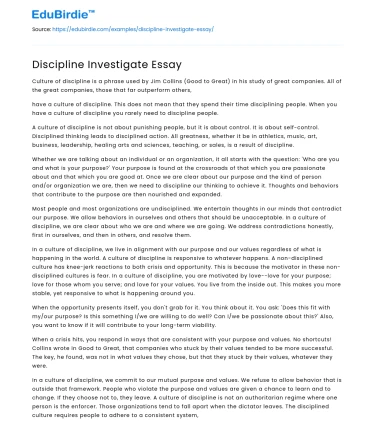Culture of discipline is a phrase used by Jim Collins (Good to Great) in his study of great companies. All of the great companies, those that far outperform others,
have a culture of discipline. This does not mean that they spend their time disciplining people. When you have a culture of discipline you rarely need to discipline people.
Save your time!
We can take care of your essay
- Proper editing and formatting
- Free revision, title page, and bibliography
- Flexible prices and money-back guarantee
A culture of discipline is not about punishing people, but it is about control. It is about self-control. Disciplined thinking leads to disciplined action. All greatness, whether it be in athletics, music, art, business, leadership, healing arts and sciences, teaching, or sales, is a result of discipline.
Whether we are talking about an individual or an organization, it all starts with the question: 'Who are you and what is your purpose?' Your purpose is found at the crossroads of that which you are passionate about and that which you are good at. Once we are clear about our purpose and the kind of person and/or organization we are, then we need to discipline our thinking to achieve it. Thoughts and behaviors that contribute to the purpose are then nourished and expanded.
Most people and most organizations are undisciplined. We entertain thoughts in our minds that contradict our purpose. We allow behaviors in ourselves and others that should be unacceptable. In a culture of discipline, we are clear about who we are and where we are going. We address contradictions honestly, first in ourselves, and then in others, and resolve them.
In a culture of discipline, we live in alignment with our purpose and our values regardless of what is happening in the world. A culture of discipline is responsive to whatever happens. A non-disciplined culture has knee-jerk reactions to both crisis and opportunity. This is because the motivator in these non-disciplined cultures is fear. In a culture of discipline, you are motivated by love--love for your purpose; love for those whom you serve; and love for your values. You live from the inside out. This makes you more stable, yet responsive to what is happening around you.
When the opportunity presents itself, you don't grab for it. You think about it. You ask: 'Does this fit with my/our purpose? Is this something I/we are willing to do well? Can I/we be passionate about this?' Also, you want to know if it will contribute to your long-term viability.
When a crisis hits, you respond in ways that are consistent with your purpose and values. No shortcuts! Collins wrote in Good to Great, that companies who stuck by their values tended to be more successful. The key, he found, was not in what values they chose, but that they stuck by their values, whatever they were.
In a culture of discipline, we commit to our mutual purpose and values. We refuse to allow behavior that is outside that framework. People who violate the purpose and values are given a chance to learn and to change. If they choose not to, they leave. A culture of discipline is not an authoritarian regime where one person is the enforcer. Those organizations tend to fall apart when the dictator leaves. The disciplined culture requires people to adhere to a consistent system, within which they have freedom and responsibility. In a culture of discipline, we all help each other to stay on track by reminding each other through ongoing feedback and being a role model.
If you want to see if your organization has a culture of discipline, listen to the stories that are told. Are they stories of accomplishment and appreciation of the efforts of people? Or, are they stories tinged with negativity and criticism? Do people tend to be generous with credit for work well done, or do they mostly talk about what 'I' did? Fear-based and egocentric stories are ultimately demoralizing and feed negativity. Stories about people going out of their way to help people, and stories where credit is given to others consistently reinforce the purpose, the values, and the way of thinking that identifies the organization at its best. We discipline our minds away from negative and victim thoughts and toward thoughts of appreciation, understanding, problem resolution, and the possibilities to be found in any situation.
The discipline that grows out of a commitment to a common purpose creates a structure, a consistency that helps people to make wise choices. The unwillingness to accept poor behavior is reassuring. Employees see leaders behaving consistently and they are inspired to think and behave in alignment with purpose and values. Extensive work rules are not needed when people are already motivated.
Whether you lead an organization or just yourself, discipline will determine much of your success. Each day examine your thinking, your behaviour, and your decisions.
Ask: 'Does this fit with my purpose? Is this a true reflection of who I am? Does this fit with my organization's purpose and values?' Learn to say 'No' to thoughts and behaviors that do not align with purpose and values. Say 'Yes' to thoughts and behaviors that affirm your purpose. Thinking, and then doing the right things consistently will keep you on purpose and lead you toward greatness.
Connect the dots. Apply this information to your workplace, your church, or spiritual community. your family, your neighborhood, and your athletic team. Is there a common purpose that inspires your passion and commitment? Are there values you live by? Do you value and serve each other to achieve your common purpose? How can you create a culture of discipline without becoming a disciplinarian? How can you work with others to create an environment where people are clear and self-motivated?






 Stuck on your essay?
Stuck on your essay?

